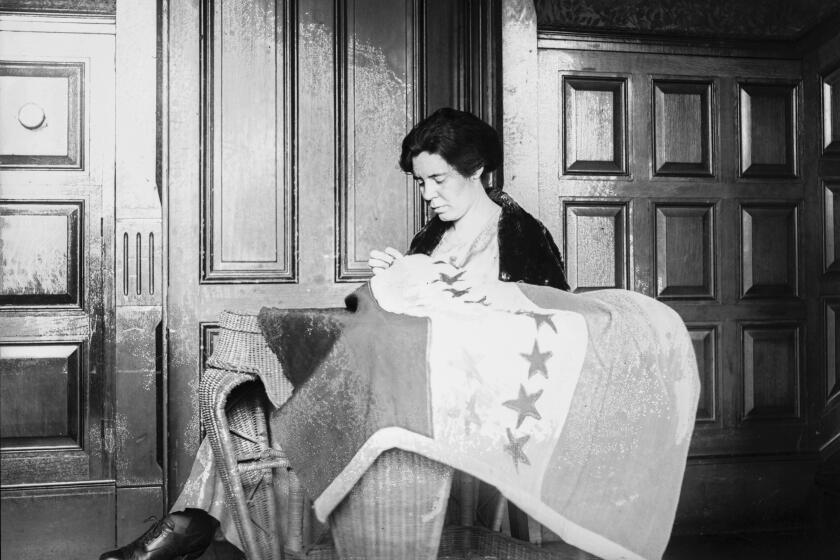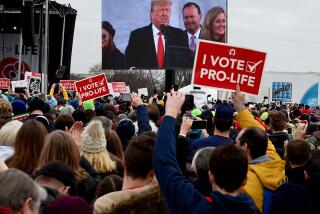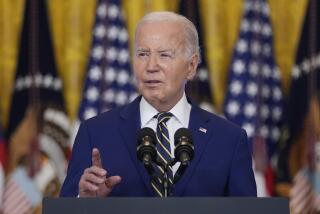Opinion: Trump doesn’t understand Susan B. Anthony’s fight, which is why he pardoned her
So President Trump has magnanimously decided to issue a posthumous pardon to Susan B. Anthony, an early and persistent advocate for women’s right to vote. That the president — whose personal history with women is, shall we say, controversial — chose to do so on the centennial of the 19th Amendment properly frames his move as a publicity stunt.
I mean, who thinks Trump is concerned about anyone’s right to vote?
The pardon arose from Anthony’s conviction on charges she voted illegally in the 1872 election in Rochester, N.Y., as part of an action planned with a number of other suffragists trying to compel the Supreme Court to rule in favor of women’s right to vote. Their argument: The 14th Amendment’s equal protection clause did not hinge on someone’s gender.
A century after women were guaranteed the right to vote with the 19th Amendment, the struggle for equality and voting rights continues.
Anthony and the others showed up at a voter registration site in a barber shop and, after threatening to sue the elections officials if they refused to let them register, entered their names in the election rolls (there’s a good history of the events and the legal issues here).
Anthony and 14 other women then showed up on election day and, using similar pressure, cast ballots, for which they were soon arrested on federal charges of casting illegal votes. Anthony refused to post bail, hoping to use her incarceration as the basis for a habeas corpus petition to more quickly move the fight to the Supreme Court.
Much to her annoyance, her lawyer posted bail on her behalf because “I could not see a lady I respected put in jail,” an act of chauvinism that killed her legal strategy (no need for a habeas petition if Anthony wasn’t denied her freedom).
The ensuing two-day trial was a sham — the judge, future Supreme Court Justice Ward Hunt, pulled his written decision out moments after the lawyers finished their closing arguments, ignored the presence of the jury of 12 men and directed that a verdict of guilty be entered. The next day, Hunt rejected an appeal for a new trial and fined Anthony $100 and the cost of the prosecution.
Anthony, to no one’s surprise, refused to pay the fine in one of the most famous speeches in the suffrage movement.
“I shall never pay a dollar of your unjust penalty,” Anthony concluded. “All the stock in trade I possess is a $10,000 debt, incurred by publishing my paper — the Revolution — four years ago, the sole object of which was to educate all women to do precisely as I have done, rebel against your man-made, unjust, unconstitutional forms of law, that tax, fine, imprison and hang women, while they deny them the right of representation in the government.
“And I shall work on with might and main to pay every dollar of that honest debt, but not a penny shall go to this unjust claim. And I shall earnestly and persistently continue to urge all women to the practical recognition of the old revolutionary maxim, ‘Resistance to tyranny is obedience to God.’”
The Democratic National Convention aims to rally the base, but anger against Donald Trump seems to be the voters’ dominant mood. Will that be enough?
But Hunt then took the wind out of Anthony’s sails by refusing to order her jailed. The case effectively died without Anthony getting her chance to put her 14th Amendment argument before the Supreme Court. None of the cases against the other women were pursued.
Interestingly, the three male election inspectors who let Anthony and the other women register and vote were also fined $25 each, which they refused to pay. They were jailed but released a month later after being pardoned by President Ulysses S. Grant — for whom Anthony had voted, and to whom she had lobbied to intervene in the inspectors’ cases.
Grant didn’t also pardon Anthony, but given the fire in her soul and her belief that she had done nothing wrong, and for which she had paid no penalty, it would be surprising if she wanted one. Besides, she could have asked when she had the chance.
But now Trump has done so — an opportunistic gesture that undercuts the power of Anthony’s original fight for voting rights nearly 150 years ago.
More to Read
A cure for the common opinion
Get thought-provoking perspectives with our weekly newsletter.
You may occasionally receive promotional content from the Los Angeles Times.













